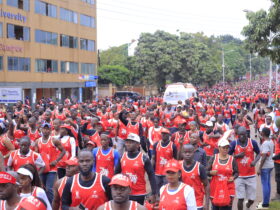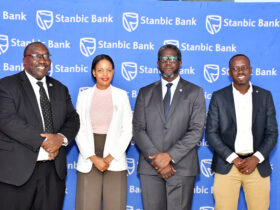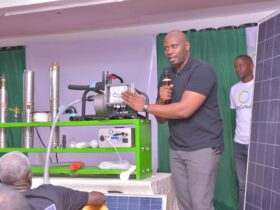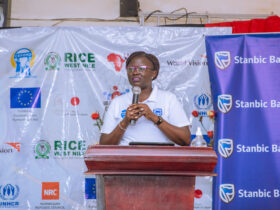Today is world toilet day. Nowadays utilities talk about aging infrastructure and smart metering and leak detection. However there was once a fierce debate in the Uganda urban water sub-sector about the most favourable institutional framework that is a public private partnership or a reformed national water utility provider, to improve the functional and fiscal efficiency so that the challenging Sustainable Development Goals/Millennium Development Goals for coverage of water supply and sanitation services in Uganda by 2015 are met. At the heart of the issue are key stakeholders: the World Bank, Government of Uganda, National Water Sewerage Corporation (NWSC) and the civil society.
Key Stakeholders: Government View vs. Public Backlash
The National Water Sewerage Corporation (NWSC) was established as a nationalised commercialised utility mandated to provide water and sewerage services in the major urban areas of Uganda. NWSC started its operations in the largest three towns (Kampala, Jinja and Entebbe) in 1987, and has since incrementally expanded its geographical coverage to 15 major towns of the country. The 1990’s saw NWSC relegated to a programme of Reform and Divestiture of Public Enterprises under the Public Enterprise Reform and Divestiture (PERD) as part of a debt recovery strategy. NWSC reports to the Utility Reform Unit (URU) of the Ministry of Finance and the PEAP (Poverty Eradication Action Plan), and is coordinated through the Water Sector Working Group (WSWG).
Most public enterprises in Uganda have been defined as non performing assets. Uganda’s debt burden in nominal terms rose from $172 million in 1970 to $3.6 billion in 1998, the year in which it first received debt relief under the highly indebted poor countries (HIPC) Initiative. The country’s external debt had increased over the decades because of arrears accumulation as a result of successive governments defaulting on debt obligations, deteriorating terms of trade, expansionary fiscal policies and heavy borrowing for economic recovery and stabilisation programmes. Historically, the country has been contracting medium to long-term loans, short-term credits having ceased in the 1970s. The proportion of concessional debt to total debt rose steadily in the 1980s and 1990s, exceeding 70 percent by the mid-1990s in line with the country’s borrowing guidelines (HIPC, 1998). The government was keen to deliver through the divestment of these non-performing assets.
The Government of Uganda had completed a water divestiture study that painted a grim picture of the water sector, the study claimed that “despite huge donor and government funding, NW&SC could not make profit, unless it addresses critical issues including inefficiency”. The study recommended that water services be leased out to private operators while local governments are allowed to play a bigger role in their localities and moves to place water into private hands (Government of Uganda 1998).
Concern began to grow from the different facets of society in Uganda. Following two years of aggressive privatisation of many parastatals with minimal resistance, questions emerged concerning shortcomings in the process and the eventual outcomes; and agitation was growing about the enterprises that had been earmarked for the next round of privatisation. People demanded explanations as the divestiture of the banking sector (notably Uganda Commercial Bank) and the energy sector had been scandal-ridden and had failed to improve services despite the price increases. Claims of farcical processes and the sale of government agencies to government individuals and allies abound. The Privatisation Unit of the Ministry of Finance did little to allay these fears, running shambolic processes with little public sensitization on the concept and context of privatisation. The public spoke out through the media:
1
“This concept makes what has been going on in Uganda look like ‘foreignisation’ and/or multinationalisation of the national economy other than privatisation”
“Water is life, goes our national slogan. How then can someone even think of selling our lives?”
“A few years ago, senior staffand some board members ofNW&SC went to Ghana to study ‘successfully’ privatised waterworks. However, the information available on the Internet now indicates that water rates in Ghana have raised so high that the majority ofwould be consumers cannot afford clean water. They have resorted to drinking dirty water and as a result a number of diseases have surfaced. Is that what we are looking for by privatising NW&SC?”
“Unless the citizens ofa country become stakeholders in the enterprises operating in their country, they tend to be apathetic to public affairs. For example, it is said that about 19% of Americans own shares in various enterprises in the United States. They, therefore, feel so much for their country, and collectively get concerned when things seem to be going wrong. On the contrary, the percentage ofUgandans, who own shares in the various enterprises in their country, is close to zero. If we do not own anything in this country, then how ‘ours’ is the country? What is ‘ours’ about it?”
“Serious investors all over the world start from ‘ground zero’ and establish their own enterprises over time. They do not go around the world taking over other people’s investment, at times for a song.” (Kinyara Sale May End in Scandal UCB By J.L.Okello Okello Daily Monitor Opinions May, 15, 2003).
Pushing the Envelope: Is the Provision of Water still an Economic or a Social Good?
Consensus on the demerits of the scheme engendered collective action. Civil Society Organisations are united under DENIVA, a Ugandan Network of Non-Governmental and Community Based Organisations (NGOs/CBOs). DENIVA provides a platform for collective action and a voice to voluntary local associations to strongly advocate for the creation of more opportunities for people and CSO participation in Ugandan development programs.
DENIVA decried the pending privatisation of NWSC, saying it would be detrimental to society’s disadvantaged lot. A substantial proportion of the Ugandan public, especially the urban poor, do not receive water and sanitation services from NWSC and have to pay a high price for alternatives. According to the Commonwealth Foundation’s recent research, “if the utility body is privatised, health conditions would worsen, as many people would resort to using unsafe water.” DENIVA’s also noted that water was not a good profit-making venture so monopolist providers tend to raise prices to survive.
The World Bank is a vital source of financial and technical assistance to developing countries around the world, and has been involved in 126 projects that have helped Uganda promote economic growth and reduce poverty, since she joined in 1963. The World Bank position is best highlighted in the Daily Monitor article stating their belief that their, and other donors’, investment had “not been matched with the necessary efficient commercial and financial management capacity that can ensure the delivery of sustainable services in the medium to long term”. NWSC had been written off by the World Bank claiming its performance indicators were below African utility standards, and recommending its closure. The World Bank’s stance was that private sector-led growth in the water sector would be beneficial; as the Bank’s Michael Klein told BBC News Online: “typically, the involvement of the private sector means more people have access to water, but that water costs more”
NWSC had been a beneficiary of government borrowing to establish public assets for water supply. Dogged by non-performing debt and facing sale, NWSC negotiated with the World Bank and Government of Uganda for a 100-day trial period were they would try to turn about the corporation through a lease model to get the utility to perform better through signed delegated management contracts with Gauff International a German firm and Osul/Ondeo, a French company. They claimed they would encourage private participation despite the controversy.
Through negotiation with NWSC management, the government reconsidered its plans on the NWSC sale, and changed its position on private participation to consider a trial period of change at NWSC. Under the Private Sector Participation programme, “a private operator would be contracted under a lease arrangement. This awaits cabinet approval of the Privatisation Unit White Paper on the privatisation of water nobody is selling anything, ‘Privatisation’ is a misleading notion”
Striving for Progress: The 100 Day Trial Period and NWSC Today
2
NWSC significantly improved its performance but were not out of the water yet. There still remain several outstanding questions concerning the motives for the possible sale of the corporation, the various models of privatisation and their delivery of services to the urban poor. After the turnabout period, the achievements of the NWSC were not entirely convincing to the World Bank who were still bent on its sale:
The World Bank is pushing for the privatisation ofthe National Water and Sewerage Corporation (NWSC) despite the corporation’s impressive annual profits which had jumped from sh4.3billion to sh6.9billion in the last fiscal year of 2002/2003. Global Water Intelligence (GWI), market leading analysts of private water projects, said NWSC is one of the few state -owned water authorities in Africa to consistently register profits. The World Bank (WB) and the government had set the virtual privatization of NWSC to be effected next year. German’s Kreditanstalt fur Wiederafbau (KfW) recently evaluated NWSC assets at worth US$120 million and an annual turnover of US$20million. (Sell Water-Bank By Emmy Allio The New Vision Friday, 18th April, 2003)
In the media reviewed, David Stiggers, an advisor to the World Bank and United States Agency for International Development, remarks in an interview: “When the World Bank and the government decided that NWSC was a disaster, I was one of the people who would have benefited by operating it. PA Consultants, a company I worked for, bid to run the corporation.
Transparency International, in its 2007-2008 Report, refutes the World Bank view. In addition to showing the poor performance of enterprises that had been sold off, evidence in American media on the Government Accountability Project, and American senate Report on World Bank claims that as much as the World Bank and the IMF have been contributors to development, they are also at the heart of influencing the rampant corruption in developing countries (Corruption Exposed at world bank march 27 2006 published in Government Accountability Project & Poorest Pay for World bank Corruption-US senator published on Friday , May 14, 2004 by Inter Press Service By Emad Mekay ).
The public continues to make allegations of interests in capital gains by government officials involved in the divestiture. Furthermore, DENIVA’s wider consultations still raise many issues after the 100 day trail period and reinforce the picture of vulnerability of the poor in the urban sector reform, and a need for specific legislation and increased capacity in NWSC aimed at ensuring wider access to water supply and sanitation facilities.
Lessons
Eventually, NWSC was not sold. After awarding a variety of management contracts to companies to collect revenue on their behalf until they finally took back all aspects of company day-to-day running in 2005, there seems to have been success from a commercialisation of technology point of view, using water as their natural capital resource. They re-invented themselves using traditional capitalist-geared management concepts and now offer extended service to other countries like Rwanda, Kenya, and Ghana as an identified model for defying the typical development paradigm. An example of its success is the fact that the NWSC recently won a $12 million contract to run Ghana Water Company Ltd in a consortium with the Dutch firm Vitens and Rand Water of South Africa, part of a $120 million World Bank-sponsored project (Olanyo, Monitor 2005). In terms of development assistance, NWSC has reinforced its relationship with the World Bank to date, amidst CSO concerns. That said, declining water levels and water supply for competing different uses in the Uganda water sub-sector remain key challenges.
“Voted the Best Public Sector Utility Company in East Africa having emerged the Best Managed Public Sector Company in Uganda in the category that was introduced in this year’s survey ofthe East Africa’s Most Respected Company Awards” (Tom Magumba, Daily Monitor 2005).
“According to a recent paper World Bank Institute (WBI) [1], the Uganda water sector offers an example of a transformational process that was driven by passionate leadership and, contrary to popular development wisdom, was front-ended by short-term results producing initiatives that led to longer-term impact” (World Bank says NWSC success defies conventional wisdom by Paul Busharizi The new Vision of Thursday, 24th November, 2005).
Under the new management since 1998, NWSC implemented various change management programmes which have resulted into tremendous performance improvements. As an example, between FY 1999/2000 and FY 2002/03, the following major improvements have been registered (NWSC annual report, 2003)
- — Water production has increased
- — Unaccounted for water has reduced
— Thenumberofnewconnectionshavegrown
3
— Staff productivity improved per 1000 connections — Operating profit after depreciation improved
A number of observations were derived that could be repeated, in water resource management (looking back). ◼ Commercialisation of public goods still largely excludes provision of services for the poorest of the poor.
The urban poor are not against the sale of private assets if it guarantees them better services.
- ◼ Proper design, education and rising awareness during campaigns is crucial for the success of what would appear to be of benefit participatory driven, poverty reduction/reform agendas and matters such as private
sector participation.
- ◼ Modelsavailingtheopportunityforpublic,privateandvoluntarysectorstoengageoffersroomforsatisfying
concerns of a vast majority of individuals if handled appropriately.
- ◼ Media review highlights the fact that many assumptions were made on little / insufficient evidence and
without consideration to all other possible solutions or experiences from the rest of the world.
— For example, no key stakeholder raised concern about, climate change resilience, energy footprint minimisation, various ecological and environmental aspects of the issue,
- ◼ Technologyandskillstransformationhaspotentialofimprovingapublicenterpriseperformanceaswitnessed by the arrangements between utilities.
- ◼ Commerlisation is not the only way of bailing out loss-making public institutions or recovering non- performing national assets.
In the 1990s, when the idea to sell non-performing assets was floated following IMFs loan recovery requests, assertions were made of its usefulness and of it being the new development fix for the underdeveloped countries. As such, many African, Asian and Latin American countries followed suite in implementing this World Bank proposal in various state enterprises. But, it was not always the case that privatisation was a necessary evil to counter inefficient public sectors.
A point in case drawn from the transport sector in Britain and from British media review on rail reforms, the Thatcher administration refused to implement full privatisation of the British public enterprises (citing British Rail). However, “arch-Thatcherite”, Cecil Parkinson, had advocated some form of privately or semi-privately operated rail network, but Thatcher declined saying she deemed it ‘a privatisation too far’. John Major’s Government went ahead with the privatisation and, according to the Guardian’s Oliver King and Simon Jerkins, this led to the poor British Rail performance and eventual collapse. Sir George Young would later admit it might have been an unwise move (The turbo-Thatcherites can’t see the limits of privatisation, by Simon Jenkins et al, the Guardian Newspaper, Wednesday February 28th 2007).
Rebecca Alowo a DEng student at Central University of Technology in the Free State, South Africa
4












